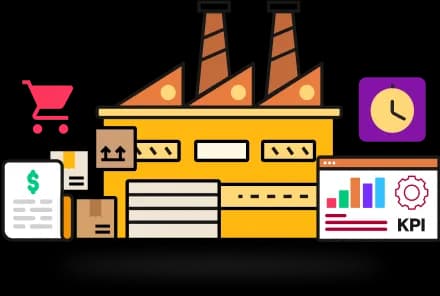Industry
Industrial Manufacturing
High Tech & Electronics
Footwear Manufacturing
Apparel & Textiles
Food & Beverage
Rubber & Plastics
Metal Fabrication
Industrial Machinery & Equipment
Construction & Engineering
Furnitures & Fixtures
Medical Device Manufacturing
Automotive Manufacturing
Aerospace And Defence
Screw Shop Manufacturing
Spring Shop Manufacturing
Solutions
Pricing
Resources
Company
GST Legacy
GST impact on Import and Export
Indian economy is one of the fastest growing sectors in the world. The balance of payment is the basic tool to evaluate a country’s economic performance and it refers to the balance between import and export as no country is fully self-sufficient. These factors including the balance of payment and trading (import and export) decide the economic fate of a nation. The Goods and Service Tax come into play in India on 1st July 2017. As we already know GST is going to change the existing business structure in India, it will also transform the import-export scenario in the country. This article will discuss how GST will influence the import and export scenario in India.
Currently, GTS is making changes in export and import in India by withdrawing wide variety of previously levied indirect taxes and it will affect the Foreign Trade Policy (FTP) of the nation. Before discussing the impact of GST on Indian trading scenario, let’s have a glimpse of what are the import and export services to get a vivid picture of the whole thing:
The supply of any service will be treated as ‘Import of service’ under the following circumstances-
If the service supplier is located outside India
If the service recipient is in India
If the supply of service place is in India
If both the supplier and recipient of service don’t belong to a distinct person
In case of ‘export of service’-
If the service supplier is located outside India
If the service recipient is in India
If the supply of service place is in India
If the payment for such services is received by the service supplier in convertible foreign exchange
If both the supplier and recipient of service don’t belong to a distinct person
How does GST treat import and export of goods and services?
The GST treats the import and export of goods as inter-state trade under Integrated Goods and Service Tax (IGST). Thus, all the IGST provisions are applicable in any kind of good and service supply regarding import and export.
Tax structure and Input tax credit
Type of Supply |
||
| Export | Import | |
| Tax Structure | 0% on supply | Levy of IGST and Basic Custom Duty (BCD) |
| Input Tax Credit | ITC and refund are allowed | ITC of only IGST allowed, ITC of BCD is not allowed |
Import, ITC and Tax structure
The import of goods and services is under IGST now with the roll out of GST on 1st July 2017. However, import has both IGST and Basic Customs Duty in present. The service providers, manufacturers, and traders of goods as well as services can balance their paid IGST against their output liability. But they cannot enjoy any credit for Basic Customs Duty (BCD) under the present GST structure. Citing an example here will be easy to understand this procedure. If a company called ‘A’ imports goods worth of INR 10,000, 10% basic customs duty is applicable on these imported goods. After importing, if the company experiences some extra expenses and sell produced goods at INR 45,000, it includes applicable respective GST rate.
The extra 10% BCD, 5% (550) CGST, and 7% (770) SGST revises the total import cost of the goods at INR 12,320. Along with these CGST and SGST rates, respectively 5% and 7% on import, the complete value of the goods in states is INR 50,400 (5% and 7% are applied on INR 45,000).
Export, ITC and Tax structure
As per the place of supply rules of the new tax regime, 0% GST is charged in any export of goods and services from India. The suppliers can avail the input tax credit under CGST/SGST and IGST. After paying the amount on input and input services, they can apply for the refund as per the 38th section of Central GST Act, 2016.
The end game
IGST covers the import and export sectors in India whereas export is GST free and import welcomes Basic Customs Duty along with IGST rate. As per the Federation of Indian Export Organization (FIEO), the exporters may face liquidity problems as the domestic companies may fall around 2% in the market. The merchant exporters may suffer from higher compliance costs. People can enjoy the fruit of GST in a long run, initial hiccups like liquidity problem in export is normal as the complete system is changing under the new tax regime.
Get Started with Deskera
Benefits of cloud business software
- Productivity
- Implementation
- Mobility
- Scalability
- Security
See related articles about India GST
What our Customers Say About Us
Whatever your business
size, Deskera enables you to
simplify operations across
business functions. Here's
what our customers say
about us.


At GoDo, we understand that managing our finances and customer relationships is essential for our success. Deskera has provided us with an easy to use and intuitive platform that has enabled us to access our financial data, track customer relationships, and manage our finances with ease. We have been able to streamline our processes, better manage our finances, and stay on top of our customer relationships. We highly recommend Deskera to any business that is looking to stay organized and efficient.
Wesley Wright
CEO, GoDo Life


We are extremely pleased with our decision to switch to Deskera and have seen a significant improvement in our business operations since making the switch. The sales process was smooth from start to finish and customer support at every step of the implementation was stellar. Highly recommend Deskera to those looking for a great ERP solution.
Wally Mears
CEO, The Jungle

We implemented Deskera's integrated platform to improve our procurement and inventory management processes to streamline our operations and improve efficiencies. I highly recommend their platform to any company looking to accelerate their growth.
Scott Phetsalod
Laboratory Manager
Run Your Business With Deskera

Products
Use Cases
 , India
, India  , Singapore
, Singapore  , and Canada
, and Canada  with
with 


